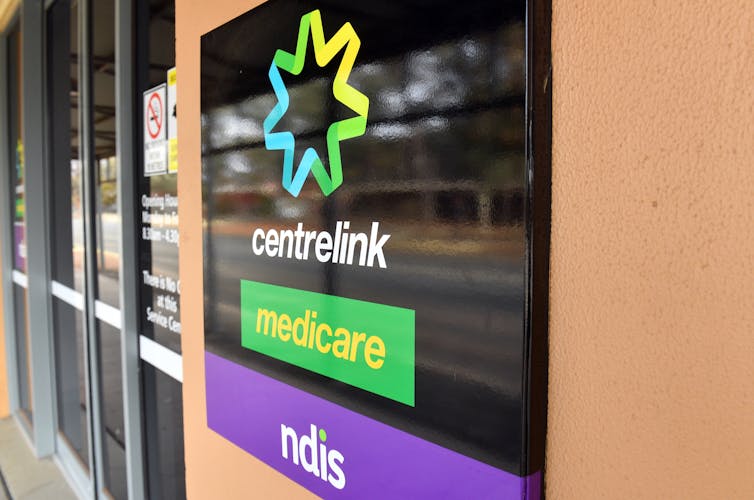‘You have to beg for help’: how our welfare system pressures people to perform vulnerability
People who rely on welfare payments to survive are often required to repeatedly tell stories of their personal hardships.
In a conditional welfare system, many must regularly attend compulsory appointments, job search training courses, and self-development and treatment programs simply to receive their payments.
People in extreme hardship often tell their stories even more frequently as they seek extra relief from non-government charities and community providers.
Those on income support payments below the relative poverty line feel the crunch of inflation and rising living costs most severely. This means many will require extra support from welfare services to meet their basic needs.
Integral to this system is the idea of “performing vulnerability”.
“Performing vulnerability” – a term I borrow from UK-based researcher Kate Brown to update Australian academic Mark Peel’s idea of “performing poverty” – is not just about repeatedly describing personal hardship.
It points to the expectation to describe hardship in particular ways that are recognisable – and hence believable – to support providers.
My book, Making a Life on Mean Welfare: Voices from Multicultural Sydney shows how the expectation to perform vulnerability to access support shapes experiences on both sides of the welfare frontline.
It can compound the cycle of disadvantage associated with receiving welfare in the long term. It does so by fostering mistrust between welfare users and providers, as well as tainting how people in need of support see themselves and their situation.

‘Tell me your story’
For my doctoral research, I spent 18 months speaking to welfare users and workers in culturally and linguistically diverse southwest Sydney. I also observed different aspects of service delivery while volunteering at a community welfare organisation. I interviewed 25 welfare users and 11 community welfare practitioners.
As a researcher of everyday experiences of welfare and poverty, I know all too well what it is like to ask people to tell their stories of hardship yet again.
I also grew up in an impoverished family reliant on welfare to get by. I know firsthand what the impact of retelling stories of hardship can be, particularly when the audience is, as Peel puts it, “someone who has the power to give or deny them something they need”.
One of the community welfare practitioners I interviewed summed it up by saying:
They’re coming again feeling ashamed. They’ve knocked on someone’s door, to tell yet again how shitty their situation is.
Her response was to chat and put them at ease before saying, “Can you tell me your story?” She would follow up by saying, “You’ve given me some insight, let’s formalise your story a little bit.”
Some welfare workers showed more scepticism, particularly when it came to giving out emergency relief.
When someone refused to share more than the minimum information required to be eligible for extra assistance, one welfare worker commented: That person doesn’t want to take responsibility.
Another practitioner told me, “That woman dramatised her situation,” but quickly added, “That doesn’t mean she wasn’t genuine.”
The willingness of people seeking assistance to disclose personal hardships and do so convincingly impacts on how deserving they may come across to those delivering support. The pressure to perform can overshadow encounters between welfare users and workers even when it doesn’t determine the outcome.

‘It’s your dignity’
Among the most marginal welfare recipients I spoke to, “performing vulnerability” was another toll of poverty.
Those experiencing the worst hardship frequently told me about having to explain “the ins and outs” and feeling “embarrassed”, “intimidated” or “uncomfortable” when they had to present to welfare agencies.
Two young people (whom I have given fictional names) powerfully conveyed the cost of telling all about their struggles:
Kane: Often if you go to them sorts of people (welfare agencies) you’ve gotta put it all out there, that you’re homeless, that you got nothing, you got no friends, no family – and then they’re gonna go boom “alright” (you get the help you came for)…
Nessa: Yeah, that’s what I had to do to get a house and it’s embarrassing (talking over each other) I think it’s embarrassing.
Kane: You gotta go down to those levels you know – it’s wrong.
Nessa: When you gotta expose everything and don’t want to, it’s, like, your dignity.
Kane: Yeah, it’s everything.
Performing is not pretending
The most marginal welfare users get a great deal of practice performing their hardship. But knowing how to tell their story a certain way is not the same as pretending.
Not only do people at the sharp end of the welfare system have to endure the hardships of poverty, but they must then recite it in a way that registers as genuine, pressing and beyond reprieve.
As a woman living on the disability support pension put it:
You don’t have the flexibility that a rich person has to respond to crisis, so you have to beg for help. That takes time! And you know you’ll be judged like it’s your fault.
A welfare system that demands disclosure of personal hardships – even when geared towards being supportive rather than suspicious – can undermine dignity and hold back those unwilling or unable to tell their story convincingly or in enough detail.
This article is republished from The Conversation (opens in new window) under a Creative Commons license. Read the original article (opens in new window) appeared on December 1, 2022.




